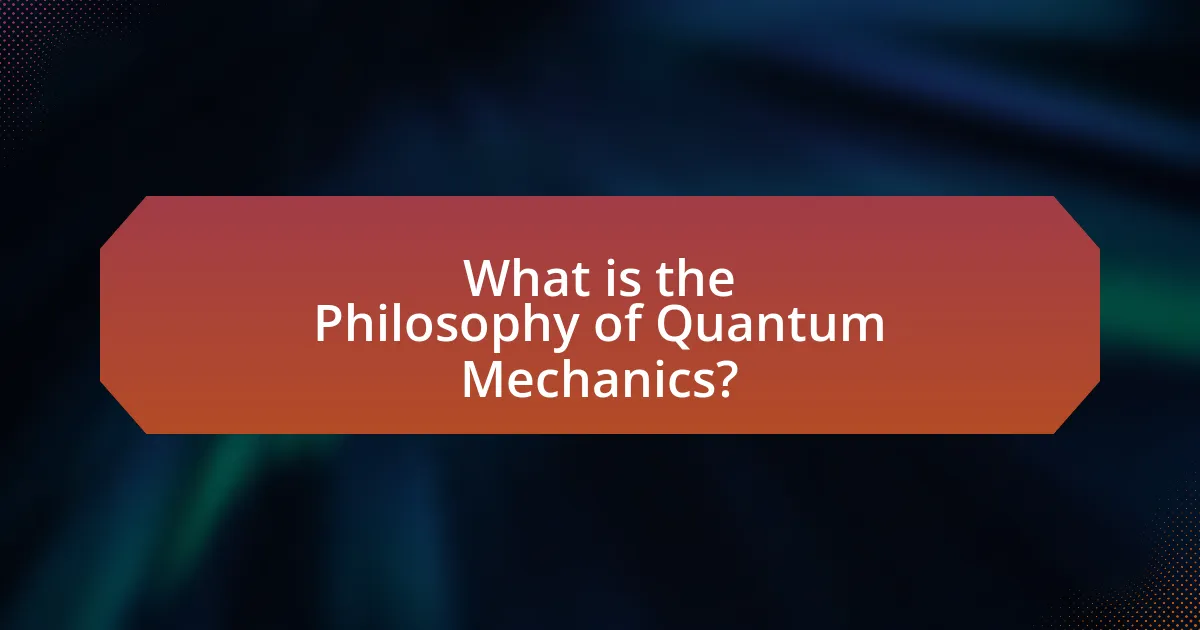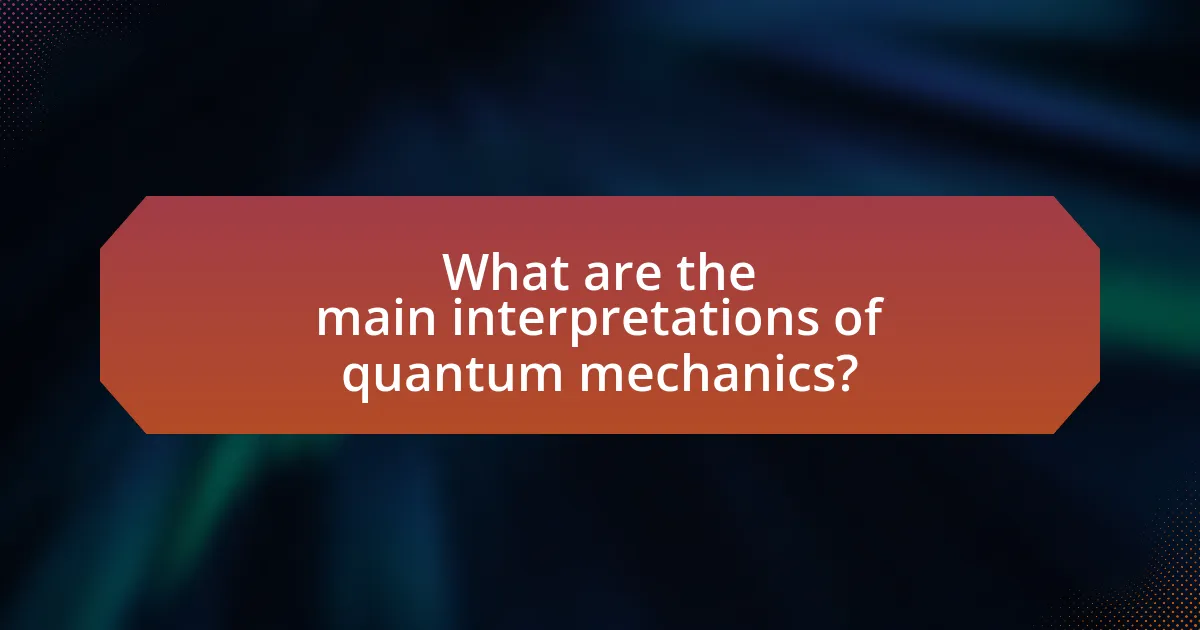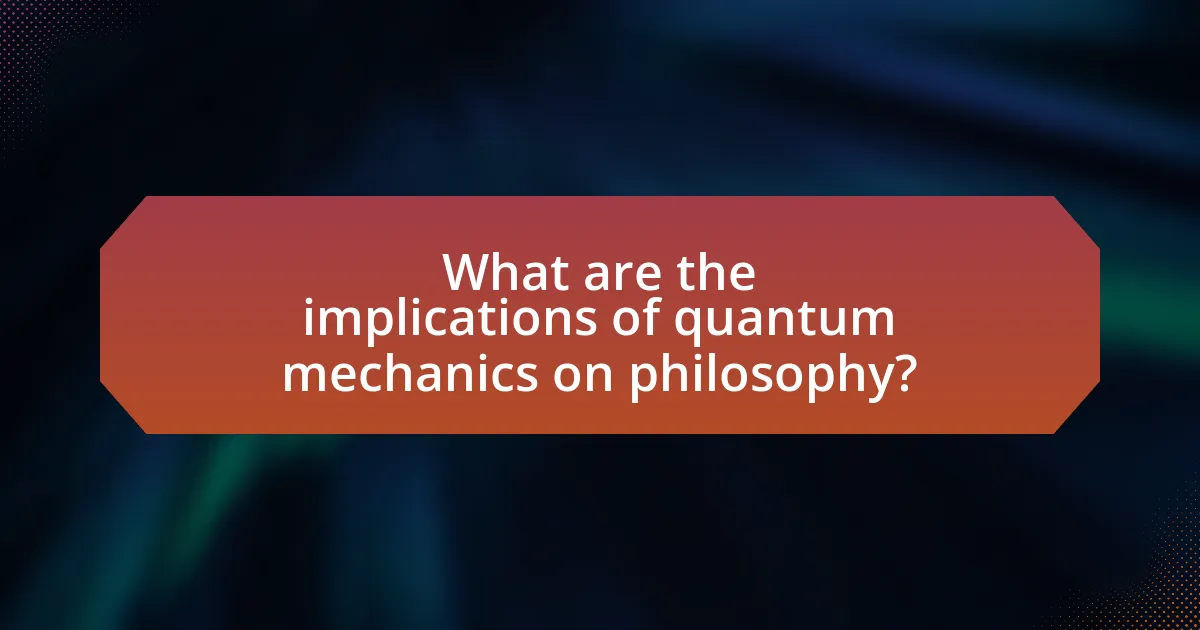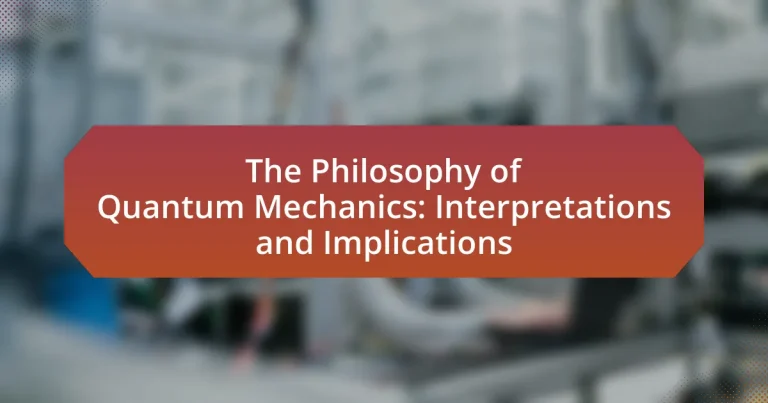The article focuses on the philosophy of quantum mechanics, exploring its foundational questions and implications regarding reality, measurement, and the observer’s role. It examines key concepts such as wave function collapse, superposition, and entanglement, highlighting how these principles challenge classical notions of determinism and locality. Various interpretations, including the Copenhagen and many-worlds interpretations, are discussed, along with their philosophical implications for understanding existence, knowledge, and free will. The article also addresses the ethical considerations and societal impacts of quantum technology, emphasizing the responsibilities of scientists in this evolving field.

What is the Philosophy of Quantum Mechanics?
The philosophy of quantum mechanics examines the foundational questions and implications of quantum theory, particularly regarding the nature of reality, measurement, and the role of the observer. This field addresses issues such as the interpretation of wave function collapse, the nature of quantum superposition, and the implications of entanglement, which challenge classical intuitions about determinism and locality. Notable interpretations include the Copenhagen interpretation, which posits that physical systems do not have definite properties until measured, and the many-worlds interpretation, which suggests that all possible outcomes of quantum measurements are realized in a vast multiverse. These interpretations highlight the philosophical debates surrounding the meaning of probability, causality, and the nature of existence in a quantum framework.
How does the philosophy of quantum mechanics differ from classical philosophy?
The philosophy of quantum mechanics fundamentally differs from classical philosophy in its treatment of reality, uncertainty, and determinism. Quantum mechanics introduces concepts such as superposition and entanglement, which challenge classical notions of a deterministic universe where objects have definite properties independent of observation. For instance, in quantum mechanics, particles exist in multiple states simultaneously until measured, as demonstrated by the double-slit experiment, which shows that particles behave as both waves and particles depending on observation. This contrasts with classical philosophy, which assumes that objects have specific properties at all times, leading to a predictable and deterministic framework. The implications of these differences extend to interpretations of reality, suggesting that observation plays a crucial role in defining the state of a system, a notion absent in classical philosophy.
What are the foundational principles of quantum mechanics?
The foundational principles of quantum mechanics include the wave-particle duality, the uncertainty principle, superposition, and entanglement. Wave-particle duality, established by experiments such as the double-slit experiment, demonstrates that particles like electrons exhibit both wave-like and particle-like properties. The uncertainty principle, formulated by Werner Heisenberg, states that certain pairs of physical properties, like position and momentum, cannot be simultaneously measured with arbitrary precision. Superposition allows quantum systems to exist in multiple states at once until measured, as illustrated by Schrödinger’s cat thought experiment. Lastly, entanglement describes a phenomenon where particles become interconnected, such that the state of one particle instantaneously influences the state of another, regardless of distance, as evidenced by experiments confirming Bell’s theorem. These principles collectively form the core framework of quantum mechanics, shaping our understanding of the microscopic world.
How do these principles challenge traditional philosophical views?
The principles of quantum mechanics challenge traditional philosophical views by introducing concepts such as superposition and entanglement, which contradict classical notions of determinism and locality. For instance, the idea that particles can exist in multiple states simultaneously (superposition) undermines the classical belief that objects have definite properties prior to measurement. Additionally, entanglement suggests that particles can instantaneously affect each other regardless of distance, defying the classical view of separateness and independent existence. These principles force a reevaluation of fundamental philosophical questions about reality, knowledge, and the nature of existence, as they imply that observation plays a crucial role in determining the state of a system, a notion that traditional philosophy often overlooks.
Why is the philosophy of quantum mechanics significant?
The philosophy of quantum mechanics is significant because it addresses fundamental questions about the nature of reality, observation, and knowledge. This field explores interpretations such as the Copenhagen interpretation, which posits that quantum systems do not have definite properties until measured, and the many-worlds interpretation, which suggests that all possible outcomes occur in separate, branching universes. These interpretations challenge classical notions of determinism and locality, prompting philosophical debates about the implications for free will, causality, and the nature of scientific theories. The significance is underscored by the fact that quantum mechanics has been experimentally validated through numerous experiments, such as the double-slit experiment, which illustrates wave-particle duality and the role of the observer in determining outcomes.
What implications does it have for our understanding of reality?
The implications of quantum mechanics for our understanding of reality suggest that reality is not deterministic but probabilistic, challenging classical notions of causality. Quantum mechanics introduces concepts such as superposition and entanglement, which indicate that particles can exist in multiple states simultaneously and that the state of one particle can instantaneously affect another, regardless of distance. This challenges the classical view of separability and locality, as demonstrated in experiments like the double-slit experiment and Bell’s theorem, which show that particles behave in ways that cannot be explained by classical physics. These findings imply that our perception of reality may be fundamentally interconnected and non-local, reshaping philosophical discussions about the nature of existence and observation.
How does it influence scientific inquiry and methodology?
The philosophy of quantum mechanics significantly influences scientific inquiry and methodology by challenging classical notions of determinism and objectivity. This influence manifests in the adoption of probabilistic models and the recognition of the observer’s role in measurement, as seen in the Copenhagen interpretation, which posits that quantum systems exist in superpositions until observed. Such interpretations necessitate a shift in experimental design, emphasizing the importance of context and the interaction between observer and system, as demonstrated in experiments like the double-slit experiment, which reveals the wave-particle duality of light and matter. This philosophical framework encourages scientists to embrace uncertainty and complexity, leading to innovative approaches in fields such as quantum computing and information theory.

What are the main interpretations of quantum mechanics?
The main interpretations of quantum mechanics include the Copenhagen interpretation, many-worlds interpretation, pilot-wave theory, and objective collapse theories. The Copenhagen interpretation, primarily associated with Niels Bohr and Werner Heisenberg, posits that quantum systems exist in superpositions until measured, collapsing into a definite state. The many-worlds interpretation, proposed by Hugh Everett III, suggests that all possible outcomes of quantum measurements occur in separate, branching universes. Pilot-wave theory, introduced by Louis de Broglie and later developed by David Bohm, asserts that particles have definite positions guided by a wave function. Objective collapse theories, such as the Ghirardi-Rimini-Weber model, propose that wave function collapse occurs spontaneously, independent of observation. Each interpretation addresses the fundamental nature of reality and measurement in quantum mechanics, reflecting ongoing debates in the philosophy of science.
How do different interpretations explain quantum phenomena?
Different interpretations of quantum mechanics explain quantum phenomena by providing distinct frameworks for understanding the behavior of particles at the quantum level. For instance, the Copenhagen interpretation posits that quantum systems exist in a superposition of states until measured, leading to wave function collapse. In contrast, the Many-Worlds interpretation suggests that all possible outcomes of quantum measurements occur in separate, branching universes, eliminating the need for collapse. Additionally, the de Broglie-Bohm theory introduces a deterministic approach, asserting that particles have definite positions guided by a pilot wave. Each interpretation addresses the same quantum phenomena, such as entanglement and wave-particle duality, but offers different ontological and epistemological implications, reflecting the ongoing debate in the philosophy of quantum mechanics.
What is the Copenhagen interpretation and its philosophical implications?
The Copenhagen interpretation is a fundamental framework in quantum mechanics that posits that physical systems do not have definite properties until they are measured. This interpretation, primarily developed by Niels Bohr and Werner Heisenberg in the early 20th century, emphasizes the role of the observer in determining the state of a quantum system. The philosophical implications of the Copenhagen interpretation include the challenge it poses to classical notions of reality, suggesting that reality is not independent of observation and that knowledge is inherently probabilistic rather than deterministic. This interpretation raises questions about the nature of existence, the limits of human knowledge, and the relationship between the observer and the observed, fundamentally altering our understanding of reality in the quantum realm.
How does the Many-Worlds interpretation challenge conventional thinking?
The Many-Worlds interpretation challenges conventional thinking by proposing that all possible outcomes of quantum measurements actually occur in separate, branching universes. This interpretation contradicts the traditional Copenhagen interpretation, which posits that quantum systems exist in a superposition of states until observed, collapsing into a single outcome. The Many-Worlds interpretation suggests that rather than collapsing, the universe splits into multiple realities, each representing different outcomes, thus eliminating the randomness associated with quantum events. This radical view forces a reevaluation of concepts such as reality, determinism, and the nature of observation in quantum mechanics, fundamentally altering our understanding of the universe.
What role does observer effect play in quantum interpretations?
The observer effect plays a crucial role in quantum interpretations by highlighting how measurement influences the state of a quantum system. In quantum mechanics, the act of observation causes a wave function to collapse, transitioning a system from a superposition of states to a definite state. This phenomenon is central to interpretations such as the Copenhagen interpretation, which posits that physical systems do not have definite properties until measured. The observer effect underscores the interplay between the observer and the observed, emphasizing that the act of measurement is not passive but actively shapes the outcome of quantum events.
How does the observer effect influence the nature of reality?
The observer effect influences the nature of reality by demonstrating that the act of observation alters the state of a quantum system. In quantum mechanics, particles exist in a superposition of states until measured, at which point they collapse into a definite state. This phenomenon was illustrated in the double-slit experiment, where particles behave as waves when unobserved but act as particles when observed, indicating that observation plays a crucial role in determining physical reality. The implications of this effect challenge classical notions of an objective reality, suggesting that reality may be fundamentally interconnected with the observer’s actions and perceptions.
What philosophical questions arise from the observer’s role in measurement?
The observer’s role in measurement raises significant philosophical questions regarding the nature of reality, the role of consciousness, and the implications of subjective experience in quantum mechanics. One primary question is whether the act of observation influences the state of a quantum system, as suggested by the Copenhagen interpretation, which posits that measurement collapses a wave function into a definite state. This leads to inquiries about the objective existence of particles independent of observation and whether reality is fundamentally probabilistic or deterministic. Additionally, the observer’s influence prompts discussions about the nature of knowledge and truth in scientific inquiry, questioning if objective reality can be known or if it is inherently tied to the observer’s perspective. These philosophical dilemmas highlight the complexities of understanding measurement in quantum mechanics and challenge traditional notions of objectivity in science.

What are the implications of quantum mechanics on philosophy?
Quantum mechanics significantly impacts philosophy by challenging classical notions of reality, causality, and determinism. The probabilistic nature of quantum events, as demonstrated in experiments like the double-slit experiment, suggests that particles do not have definite properties until measured, leading to philosophical debates about the nature of existence and observation. This has prompted discussions on the interpretation of quantum mechanics, such as the Copenhagen interpretation, which posits that reality is fundamentally tied to measurement, and the many-worlds interpretation, which implies a multiverse of possibilities. These interpretations raise questions about free will, the nature of knowledge, and the limits of human understanding, fundamentally altering philosophical discourse on metaphysics and epistemology.
How does quantum mechanics affect concepts of determinism and free will?
Quantum mechanics challenges traditional concepts of determinism and free will by introducing inherent randomness at the quantum level. In classical physics, determinism posits that future states of a system can be precisely predicted from its current state, but quantum mechanics, particularly through phenomena like wave function collapse and particle superposition, suggests that outcomes are probabilistic rather than predetermined. For instance, the double-slit experiment demonstrates that particles can exhibit both wave-like and particle-like behavior, leading to unpredictable results based on observation. This unpredictability implies that if fundamental processes are not deterministic, then the notion of free will, which relies on the ability to make choices independent of predetermined outcomes, is also called into question. Thus, quantum mechanics not only alters the understanding of physical reality but also invites philosophical debates regarding the nature of human agency and decision-making.
What arguments exist for and against determinism in a quantum context?
Arguments for determinism in a quantum context include the interpretation that quantum mechanics can be reconciled with classical determinism through hidden variables, as proposed by physicist David Bohm. This interpretation suggests that underlying deterministic processes govern quantum events, allowing for predictability if all variables are known. Conversely, arguments against determinism arise from the Copenhagen interpretation, which posits that quantum events are fundamentally probabilistic, as demonstrated by experiments like the double-slit experiment, where particles exhibit wave-particle duality and do not have definite states until measured. This inherent randomness challenges the notion of determinism in quantum mechanics.
How do quantum mechanics and free will intersect philosophically?
Quantum mechanics and free will intersect philosophically through the debate on determinism versus indeterminism. Quantum mechanics introduces fundamental randomness at the subatomic level, as evidenced by phenomena such as particle superposition and wave function collapse, which challenge classical deterministic views. This randomness suggests that not all events are predetermined, potentially allowing for free will in decision-making processes. Philosophers like Daniel Dennett argue that if quantum events influence brain processes, this could provide a basis for free will, while others, like Albert Einstein, maintained that the universe is fundamentally deterministic. The implications of these interpretations continue to fuel discussions on the nature of human agency and moral responsibility.
What ethical considerations arise from quantum mechanics?
Ethical considerations arising from quantum mechanics include the implications of quantum computing on privacy, the potential for misuse of quantum technologies in surveillance, and the moral responsibilities of scientists in communicating the uncertainties inherent in quantum interpretations. Quantum computing can enable unprecedented data processing capabilities, raising concerns about data security and individual privacy rights. Additionally, the ability to manipulate quantum states may lead to advancements in surveillance technologies, prompting debates about consent and ethical boundaries. Furthermore, the interpretations of quantum mechanics, such as the Copenhagen interpretation or many-worlds interpretation, challenge traditional notions of reality and causality, which can influence ethical frameworks in decision-making and responsibility. These considerations highlight the need for a robust ethical framework to guide the development and application of quantum technologies.
How might quantum technology impact societal norms and values?
Quantum technology may significantly alter societal norms and values by reshaping concepts of privacy, security, and trust. As quantum computing enables unprecedented data processing capabilities, it challenges existing encryption methods, potentially compromising personal and organizational data security. For instance, the advent of quantum computers could render current cryptographic systems obsolete, leading to a societal shift in how individuals perceive and manage their privacy. Additionally, the implications of quantum entanglement and superposition may influence philosophical discussions around determinism and free will, prompting a reevaluation of ethical frameworks. Historical precedents, such as the introduction of the internet, illustrate how technological advancements can transform societal values, suggesting that quantum technology will similarly provoke profound changes in collective attitudes toward privacy, security, and ethical considerations.
What responsibilities do scientists have regarding quantum research?
Scientists have the responsibility to conduct quantum research ethically and transparently. This includes ensuring the integrity of their data, avoiding fabrication or falsification, and being honest about the limitations and implications of their findings. For instance, the American Physical Society emphasizes the importance of ethical standards in research, which includes peer review and open communication of results. Additionally, scientists must consider the societal impacts of their work, particularly in areas like quantum computing and quantum cryptography, where potential misuse could have significant consequences. By adhering to these responsibilities, scientists contribute to the advancement of knowledge while safeguarding public trust in scientific inquiry.
What practical insights can be drawn from the philosophy of quantum mechanics?
The philosophy of quantum mechanics offers practical insights into the nature of reality, emphasizing the role of observation and the interconnectedness of systems. This perspective suggests that the act of measurement affects the state of a system, as demonstrated by the observer effect in quantum experiments. Additionally, concepts such as superposition and entanglement challenge classical notions of separateness, indicating that particles can be correlated regardless of distance, which has implications for technologies like quantum computing and secure communication. These insights underscore the importance of probabilistic thinking and the limitations of classical determinism in understanding complex systems.




